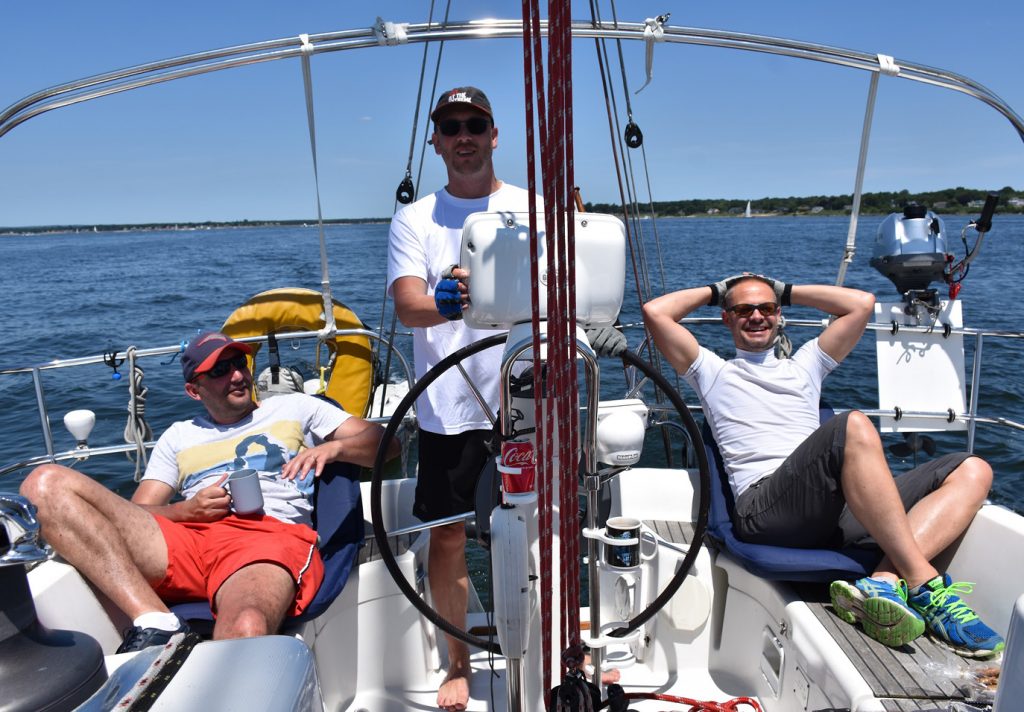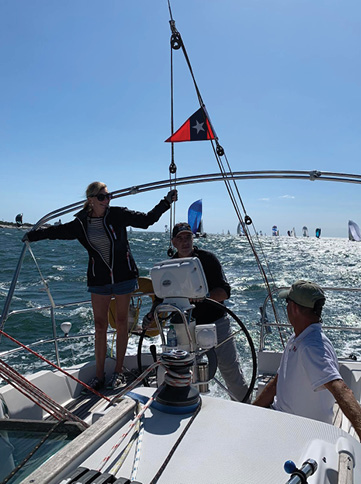A comprehensive guide
By Captain Deborah Marlor of Sailing & Boating LLC, and CoBoaters
Sailing and boating are more fun when they’re shared with friends, family, partners and fellow sailors or boaters, but it’s not always easy to create and maintain good crew/skipper relationships on board. So, what’s the best way to do that? Here are a few basic rules and good practices to follow, for both crew and skippers.
Create your online sailing profile.
· Your sailing resume should showcase your skills, capabilities, and experience.
· Highlight your attributes by giving a clear and accurate description of yourself and how others have seen you perform.
· Emphasize your strengths and the crew positions in which can you be counted on.
· Know your expectations, whether as a crew or skipper
· Be honest.
· Safety First: Remember that the objective is always for the boat and the crew to arrive safely!

Happy skipper, happy crew! © CoBoaters.com
Get to know each other.
This part is probably the most important. People need to be comfortable with one another to start a healthy relationship, so there should be an open discussion and interviews prior to sailing together. Posting a sailing resume online helps, as does describing your boat if you are a skipper.
The crew interview
You need to know what you can do on board, what you can bring to the table not only as a sailor but also as a person and a team member. Sailing and boating are not only about getting the boat to a destination. It’s also about living together in a very limited space.
Consequently, we advise you to think about the following:
· Is this a good fit?
· What skill(s) do you bring to the crew?
· Expectations & Responsibilities
· Honesty and realities
· What is the goal to be achieved?
· Questions for you to ask the skipper:
1. What is the most difficult situation you’ve had at sea? Can you share the situation and how you handled it?
2. What should I know about you?
The skipper interview
As skipper, it’s essential to know if the crew can perform what you expect
· Is this a good fit?
· What skills do I need on my boat?
· Expectations & Responsibilities
· Honesty and realities
· Questions to ask potential crew:
1. What’s your experience to date
2. Why I should choose you?
3. What do you do when you see a possible situation and you are concerned?
Stay True North!
Maintain consistency in your relationship, looking forward and advancing in the same direction. Once you talked to the other party, you must think about what was said and ask yourself a few questions. If you think something needs to be clarified, get in touch again and talk about it.
· Do I like this person?
· Do I respect and trust this person?
· Do I feel confident that this is the person I want to have for this position?
· Do I feel like the person is responding honestly and with integrity?
· Can I see this person with me for an extended period of time?
Do not settle. If you have that feeling in your gut, don’t do it.
Rules to live by
On board or on shore during a cruise, follow some rules and maintain consistency with your team and friends.
· I show up being the person that I said I was, and I do what I say.
· I am respectful and accountable.
· I am prepared and on time for my duties, shift/watch.
· If I do not know, I ask.
· If I need help, I ask.
· Have fun!
The Boat Ground Rules
Each skipper will define his or her own rules on board. As a crew you must understand and follow those rules. More and more skippers will ask you to sign a contract, especially if you are going away for a long time or for on offshore voyage.
· Complete a contract between captain and crew.
· No alcohol or drugs at sea, and make sure you are in good condition when ready to leave.
· Be willing to take direction and not take things personally.
· Be respectful and honest, and take initiative.
· Anticipate and get input from your captain.
· Make the boat a better place than when you got there.

Cohesive crew = fast boat. © CoBoaters.com
Learn how to sail.
One last piece of advice is to actively and constantly improve your sailing skills. Sailing with others will help you gain experience and acquire confidence. We always learn something new when we are on the water. However, taking formal classes with a professional organization is key to learn more and faster. Visit the Resource page at CoBoaters.com to find out a list of organization that can help you. ■
An award-winning entrepreneur, Captain Deborah Marlor, your “Sailing Life Coach,” has a mission to expand boating knowledge and safety to create joy on the water. She and her husband Hugh live aboard their Beneteau Oceanis 38 Simplicity. They’ve sailed more than 25,000 miles along the West and East coasts, the Caribbean and more. She is a U.S. Coast Guard Licensed Captain, an instructor with Cruiser University, and holds International Proficiency Certification. Her company, Sailing & Boating LLC, offers a range of courses from Basic Courses to Ocean Dream MasterClass, as well as Cruiser Coaching for individuals and couples, and several workshops. To learn more, visit sailingandboatingllc.com.
CoBoaters is the leading sailing and boating crew finder network, allowing crew to find sailing opportunities and boat owners to find crew. CoBoaters connects thousands of boat owners with crew for adventures in North America, the Caribbean and worldwide. Visit CoBoaters.com to learn more.




